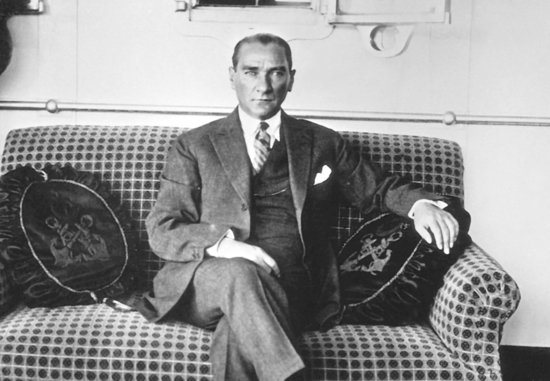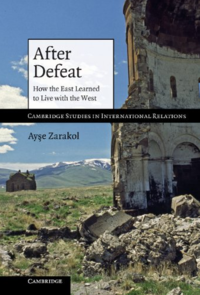Book review: After Defeat. How the East Learned to Live with the West. By Ayse Zarakol. Cambridge University Press, 2011. 312 pages. R$ 49,75 (www.amazon.com.br)
What do Turkey, Japan and Russia have in common? In her fascinating book After Defeat, Ayse Zarakol points to three similarities. First, they were not part of the original Westphalian system, despite having existed prior to the seventeenth century. Second, some time after the Peace of Westphalia in 1648, rulers of Turkey, Japan, and Russia all made a deliberate decision to join the state system emerging from Europe, by accepting its international standards and borrowing a number of the domestic institutions of its major players (symbolized by reformers such as Peter The Great and Catherine I in Russia, Mahmud II and Kemal Atatürk in Turkey and the Meiji Emperor in Japan). Finally, despite their best efforts (which produced fierce internal resistance, revolutions, restorations, backlashes identity crises all connected to “catching up”), none of the three states have been able to shed their “outsider” status in international Western society.
To properly understand the three, Zarakol argues, it is necessary to grasp the highly stratified nature of global order, which functions purely according to social status — like India’s caste system. Turkey, Japan and Russia are “stigmatized” states, that have become extra-sensitive to concerns about status, and shape their foreign policies accordingly. Because this insecure relationship with the West was one of the key ingredients used to forge a “modern sense of self,” it has remained ingrained in the identities of these states. As the author asserts,
This common ailment of Turkey, Japan, and Russia is the only thing that explains why the similarities between the political choices of these otherwise very different countries are so striking.
Some readers will accuse Zarakol of overestimating the role of the West as an explanatory variable when trying to explain the decisions of policy makers in Ankara, Moscow and Tokyo. Yet the key argument of After Defeat is powerful and hard to dismiss easily, and her three case studies (chapters 3, 4 and 5) are very engaging. Zarakol repeatedly focuses on how elites in the non-West all over the world — even those critical of the West — embraced the dichotomy of backwardness and modernity: “They believed, along with their European contemporaries, that there really was a developmental lag between civilizations.” Western superiority was no longer framed as material, but one of cultural, moral and social capability.

Atarurk, who launched a program of revolutionary social and political reform to modernize Turkey. These reforms included the emancipation of women, the abolition of all Islamic institutions and the introduction of Western legal codes, dress, calendar and alphabet, replacing the Arabic script with a Latin one.
Zarakol’s assertion that — for at least some states in the international system — international status, respect and acceptance are primary motivators in decision-making, is of course hard to prove, and will thus fail to convince many realist and liberal internationalist scholars. The main arguments of After Defeat are diametrically opposed to G. John Ikenberry’s After Victory, which stresses the inclusive nature of Post-World War II order. Western-led global order, as Zarakol depicts it, seems, in a cruel way, open in principle, but highly exclusive in practice.
Zarakol writes that a cursory survey of IR theories may lead one to the conclusion that non-Western powers are little more than decorative plants in modern international society:
While the abstract, ahistorical models of socialization one encounters in neorealism, neoliberalism, and certain variants of constructivism mistakenly impute equal maneuvering room to all actors in the international system, the historically conscious narratives of the English School literature have traditionally downplayed almost all agency at the receiving end.
The stratification of the international system, according to Zarakol, is thus reproduced in IR theory.
This may have important consequences in the real world. Non-Western agency is often overlooked when explaining the past, and IR scholars have great difficulty predicting the behavior of non-Western powers. For example, most observers still try to understand China in a pro-West (i.e., accepting existing rules) or anti-West (i.e., challenging them) dichotomy. That overlooks the agency non-Western actors had and continue to have in the creation and modification of today’s rules and norms. In the same way, this dichotomy is certain to misinterpret China’s foreign policy strategy — Beijing’s institutional entrepreneurship, for example, eludes the two facile and overly simplistic extremes of either confronting or joining existing order. The creation of several China-centric institutions will allow China to embrace its own type of competitive multilateralism, picking and choosing among flexible frameworks, in accordance with its national interests.
The way Western foreign policy makers analyze Turkey is also often framed between integration and confrontation, very much symbolized by Turkey’s attempts to join the European Union. Unexpected moves, however — such as seeking stronger ties with neighbors in the East and South — generally lead observers to wonder whether Turkey had “turned its back on the West.” It must be mentioned, however, that even European countries, like Germany, often face such criticism after decisions US commentators consider to be wrong, such as Berlin’s abstention from Resolution 1973 on Libya or its initial reluctance to adopt a tougher line vis-à-vis Russian aggression against Ukraine (“Leaving the West behind: Germany looks East“).
Critics may rightly point out that Zarakol herself describes today’s international order as more Western than it actually is. She writes that
There may be a limit to how long the majority of the world’s population will tolerate living under an international system whose rules they have very little input in, and one in which even the most successful of outsiders (e.g. Japan) are never accorded the full respect that their material success entitles them to.
That clearly underestimates the significant influence non-Western powers have had in the creation of rules and norms — one may think of India’s leadership to denounce apartheid South Africa at the UN, or the African origins of the Responsibility to Protect (R2P).
Turning to contemporary politics, the author argues that Japan’s and Turkey’s overtures towards the West carried a political cost in the non-West — yet there is little evidence that Turkey’s NATO membership, its candidacy to the EU, or Japan’s OECD membership negatively affected their ties to other non-Western countries. Some may say Turkey’s NATO membership makes it ineligible for BRICS membership, yet such claims are largely hypothetical.
Finally, the author argues that “we need a more meritocratic international order, instead of one that is only described as such.” While there is indeed a hard-wired hierarchy in the international system that will increasingly come under strain as a more multipolar order emerges, this cannot hide the fact that several emerging powers (such as India and Brazil) could have played a far more active role in international affairs over the past years. China is perhaps the only non-Western power that has begun to engage more systematically on a whole range of issues — for example, there are today more Chinese peacekeepers in the field than of the other P5 combined. Today’s order is far from democratic, but emerging powers could be far more influential than they are today.
Still, Zarakol’s analysis is innovative and thought-provoking, and her contribution can be expected to remain relevant for many years to come.
Read also:
Book review: “Liberal Leviathan” by G. John Ikenberry
Book review: “The Boxer Rebellion and the Great Game in China” by David J. Silbey
International Politics in 2015: Ten Predictions
Photo credit: Mustafa Kemal Ataturk Photos









